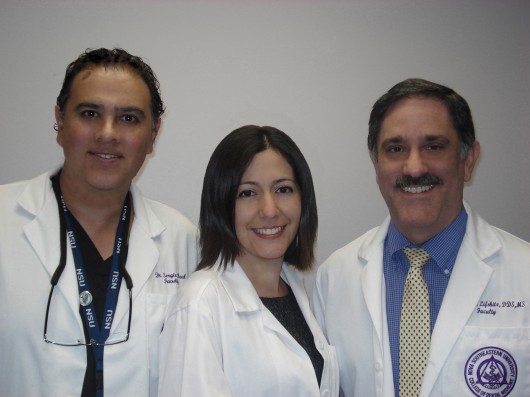NSU Newsroom
SharkBytes
Horizons
This version of NSU News has been archived as of February 28, 2019. To search through archived articles, visit nova.edu/search. To access the new version of NSU News, visit news.nova.edu.
This version of SharkBytes has been archived as of February 28, 2019. To search through archived articles, visit nova.edu/search. To access the new version of SharkBytes, visit sharkbytes.nova.edu.
Inviting Smiles: Orthodontic Treatment at NSU College of Dental Medicine
By: Shiva Khatami, DDS, Ph.D., assistant professor; Abraham Lifshitz, DDS, MSc, professor; Sergio Real, DDS, assistant professor, NSU College of Dental Medicine
Your smile sends an invitation to the world around you; an invitation to engage in a positive social interaction and share the joy of living. Orthodontic treatment improves quality of life by enhancing the esthetics of the smile and establishing a healthy and functional relationship between the teeth and their surrounding tissues.
Orthodontic problems can be inherited or acquired. Discrepancies in the amount and direction of growth of the upper and lower jaws can lead to unpleasant facial esthetics. Premature loss of primary teeth may lead to loss of space for permanent dentition to erupt. Prolonged habits such as thumb-sucking may lead to flaring of the teeth and opening of the bite. Some problems can be addressed with orthodontic treatment alone and some require an interdisciplinary treatment including orthognathic surgery or restoration of the missing dentition.
The American Association of Orthodontists recommends that all children be screened no later than age 7 to detect orthodontic problems such as missing or extra teeth, problems with eruption of teeth, spacing or crowding, discrepancies in jaw growth and effects of habits on the bite. An orthodontic consult is warranted if you note: early or delayed loss of primary teeth, spaced, crowded or misaligned teeth, upper and lower teeth not meeting or lower teeth biting into the roof of the mouth, prolonged thumb-sucking or lip biting, and unbalanced facial appearance resulting from jaws that are either too far forward or back. Orthodontic treatment at this stage can intercept a developing problem or modify the growth of the jaws. Usually, a comprehensive orthodontic treatment will follow when all permanent teeth erupt. However, the interceptive treatment may help to alleviate the severity of most problems, hence shorten the treatment time at a later date.
Most orthodontic treatments begin between ages of 9 to14. However, orthodontic problems can be treated at any age. Adults can benefit from orthodontic treatment to improve the esthetics of their smile and establish a healthy environment for teeth and surrounding tissues. Orthodontic treatment can help prevent or improve periodontal problems, reduce or improve the bone loss around the teeth, and prepare the interrelationship of the teeth and the jaws prior to restorative treatments.
The Faculty Practice at NSU College of Dental Medicine offers orthodontic treatment to patients of any age and any type of orthodontic problems. The clinic is located on the second floor of the College of Dental Medicine. Several members of the faculty from the Department of Orthodontics treat patients in the Faculty Practice Clinic who are members of the American Association of Orthodontists. In addition, faculty members from departments of surgery, periodontics, prosthodontics, endodontics and pediatrics treat patients in the same clinic and work collaboratively with the orthodontists to address multidisciplinary problems.
Screening appointments are scheduled on a continuing basis. To make an appointment, please call (954) 262-7213.
